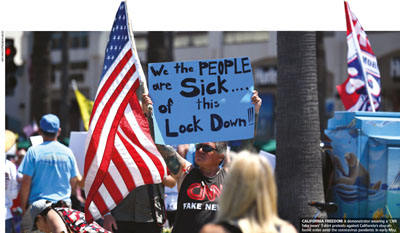CORONAVIRUS CONUNDRUMS

HERD IMMUNITY VS SHELTER
Saro Thiruppathy discusses the need for people to return to normality before a vaccine is found
 Across the world, people have wanted to break free from the shackles of ‘stay at home’ orders that confine them to their houses – and deny them the freedom to move about and enjoy life the way they wish to.
Across the world, people have wanted to break free from the shackles of ‘stay at home’ orders that confine them to their houses – and deny them the freedom to move about and enjoy life the way they wish to.
Fed up with the isolation that physical distancing calls for, they’ve desperately sought the sun, sea and sand – at least in countries in the northern hemisphere where spring is leading to a warm summer.
In addition to warmth and sunshine, there’s also been the urgent need in most parts of the world to get back to work and restart faltering businesses and thus economies. And as people are finding life harder and costlier, some are questioning the success of lockdowns and curfews in flattening the curve of the coronavirus pandemic.
Many in the West have wondered whether they should take a chance and get back to mainstream life as quickly as possible although others have taken them to task.
It’s in this context that the dialogue on herd immunity has grown since many Westerners believe that staying at home does little to eliminate the deadly virus.
However, in reality lockdowns and curfews have played a major role in containing the viral outbreak simply because such actions have denied the virus new hosts.
In addition to sheltering in place, the practice of hand hygiene and social distancing, as well as wearing masks, have contributed to flattening the curve and helped many countries contain an outbreak.
The ideal situation would be for people who have been infected with COVID-19 to stay home and desist from social mingling until it mysteriously vanishes like the SARS coronavirus in 2003 or a vaccine is approved and made available. But the harsh reality is that people need to get back to work and keep the wolf from the door.
HERD IMMUNITY In epidemiological terms, herd immunity occurs when a group of people have gained sufficient immunity to a disease. As a result, the infection is confined and will not spread within that cluster of people.
For herd immunity to be activated, there needs to be natural immunity or a vaccine that provides people with the protection they need to be safe from an infection. And in the event a vaccine for COVID-19 is found, epidemiologists believe that at least 70 percent of the population will need to be vaccinated for some degree of herd immunity to become active.
So if a vaccine or natural immunity due to a variety of genetic factors isn’t present, it will be highly risky to enter mainstream society without the precautionary measures such as masks, physical distancing etc.
FINDING IMMUNITY After nearly four months of economic inactivity in most countries, a huge death toll and an overwhelmed healthcare system, the world has been literally left gasping for air.
Therefore, for some form of normality to return, the Earth needs to be relatively safe; and as such, many countries are working around the clock to achieve this goal.
Some scientists are trying to develop a vaccine while others are seeking a treatment or process that gives COVID-19 patients a fighting chance to outlive the lifespan of the virus… and thus heal themselves and the world. In addition to the many labs that are reportedly working on a vaccine, AstraZeneca will manufacture 100 million doses while the Serum Institute of India plans to produce up to
60 million doses of a potential vaccine that’s currently undergoing clinical trials in the UK.
Meanwhile, there are some interesting trials in the UAE where stem cells are extracted from the patient’s blood and reintroduced to the bloodstream after ‘activating’ them. This activation includes the creation of a fine mist and through nebuliser therapy patients can inhale the stem cells deep into their lungs.
The stem cells help in the regeneration of cells in the lungs, and modulate the patient’s immune response to prevent it from going into overdrive and causing further damage to healthy cells in the body. The UAE government granted the patent for this process when the initial phase of clinical trials with 73 coronavirus patients had been successfully completed.
Meanwhile, the FDA in the US has approved the use of antiviral drug Remdesivir to treat COVID-19 patients. The jury is still out on its efficacy.
SEEKING ANSWERS These are both scary and interesting times as scientists put forward theories while they struggle to find answers to baffling questions. One particularly thought-provoking question is why SARS-CoV-1 mysteriously disappeared in 2003. Then there’s a theory based on a study of 2,000 patients in China, which claims that people with a certain blood group are more vulnerable to contracting COVID-19 than others.
In 2016, a fascinating study released by the Institut Pasteur in Paris found that Africans have a stronger immune response to infection compared to Europeans. This is partly due to the interbreeding of early Europeans with Neanderthals. As a result, Europeans are more likely to develop infections while Africans are more susceptible to autoimmune inflammatory diseases.
So as scientists search for a vaccine or cure for COVID-19, it’s advisable that people around the world act cautiously, stay safe and keep healthy.




Leave a comment